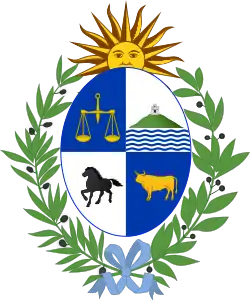Law of Uruguay
The legal system of Uruguay belongs to the Continental Law tradition.
 |
|---|
| This article is part of a series on the politics and government of Uruguay |
|
|
The basis for its public law is the 1967 Constitution, amended in 1989, 1994, 1996, and 2004. According to it, Uruguay is a democratic republic. There is a clear separation of functions, between the President of the Republic, the Legislative Power and the Judiciary.[1]
On the other hand, private relationships are governed by the Uruguayan Civil Code, which was first published in 1868, thanks to the work of Tristán Narvaja.[2]
See also
- Legal systems of the world
- Politics of Uruguay
- History of Uruguay
- Supreme Court of Uruguay
References
- Constitution of Uruguay (in Spanish)
- Uruguayan Civil Code Archived 2013-12-13 at the Wayback Machine (in Spanish)
External links
- Search laws by number - Parliament of Uruguay (in Spanish)
- IMPO - National Directorate of Official Publications (in Spanish)
- Legal Framework - Office of the President (in Spanish)
- El Derecho Digital (in Spanish)
- La Ley Online (in Spanish)
This article is issued from Wikipedia. The text is licensed under Creative Commons - Attribution - Sharealike. Additional terms may apply for the media files.
